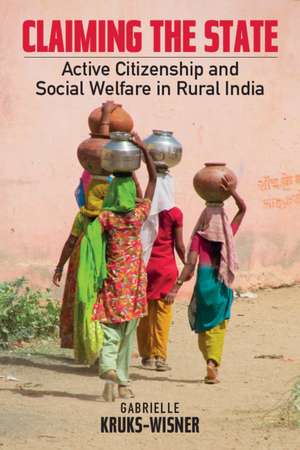Claiming the State: Active Citizenship and Social Welfare in Rural India
Autor Gabrielle Kruks-Wisneren Limba Engleză Paperback – 15 aug 2018
Preț: 266.79 lei
Nou
Puncte Express: 400
Preț estimativ în valută:
51.05€ • 53.44$ • 42.24£
51.05€ • 53.44$ • 42.24£
Carte tipărită la comandă
Livrare economică 02-08 aprilie
Preluare comenzi: 021 569.72.76
Specificații
ISBN-13: 9781316649008
ISBN-10: 1316649008
Pagini: 336
Dimensiuni: 152 x 229 x 19 mm
Greutate: 0.48 kg
Editura: Cambridge University Press
Colecția Cambridge University Press
Locul publicării:New York, United States
ISBN-10: 1316649008
Pagini: 336
Dimensiuni: 152 x 229 x 19 mm
Greutate: 0.48 kg
Editura: Cambridge University Press
Colecția Cambridge University Press
Locul publicării:New York, United States
Cuprins
Part I. Introduction and Theory: 1. Introduction: citizenship and social welfare; 2. A theory of active citizenship; Part II. Citizenship Practice In Rajasthan: 3. The institutional terrain of the state; 4. Seeking the state: claim-making patterns and puzzles; 5. Encountering the state: citizens' social and spatial exposure; 6. Claiming the state: exposure as a catalyst for citizen action; Part III. Consequences and Extensions: 7. The consequences of claim-making; 8. Conclusion: active citizenship in Rajasthan and beyond; Appendices; References; Index.
Recenzii
'Studies in political science are often written as if citizens interact with the state only during elections. Yet, as Gabrielle Kruks-Wisner shows in her remarkable book, many of the most important interactions that people in rural Rajasthan have with state actors - about access to water, electricity, healthcare, food, shelter, and other forms of social protection - are almost daily activities. This makes it crucial to understand the conditions under which citizens do (or don't) make claims for these services. Claiming the State provides compelling answers, and in so doing, provides new and important insights into how citizens in poor countries interact with their governments.' Daniel N. Posner, James Coleman Professor of International Development, University of California, Los Angeles
'Kruks-Wisner rightly notes scholars of political participation have remained preoccupied with exceptional or episodic moments: mass mobilizations, armed struggles, voting, and campaign rallies. In doing so, they have neglected the quotidian forms of participation that define the political lives of most citizens across the global south. Her book rightly shifts attention to everyday claim-making, and asks important questions: who makes claims, when, and how? Using meticulously collected data from north India she finds surprising answers: claim-making is not the exclusive purview of men, urbanites, the wealthy, or the socially privileged. It can occur in even the most unlikely pockets, especially when citizens develop social and economic networks extending beyond their locality or social group. Claiming the State should have a sizeable impact in reorienting studies of political participation towards life between elections, and in how we think of the practice of citizenship in contemporary India.' Tariq Thachil, Vanderbilt University, Tennessee
'Kruks-Wisner rightly notes scholars of political participation have remained preoccupied with exceptional or episodic moments: mass mobilizations, armed struggles, voting, and campaign rallies. In doing so, they have neglected the quotidian forms of participation that define the political lives of most citizens across the global south. Her book rightly shifts attention to everyday claim-making, and asks important questions: who makes claims, when, and how? Using meticulously collected data from north India she finds surprising answers: claim-making is not the exclusive purview of men, urbanites, the wealthy, or the socially privileged. It can occur in even the most unlikely pockets, especially when citizens develop social and economic networks extending beyond their locality or social group. Claiming the State should have a sizeable impact in reorienting studies of political participation towards life between elections, and in how we think of the practice of citizenship in contemporary India.' Tariq Thachil, Vanderbilt University, Tennessee
Notă biografică
Descriere
Explores the conditions that shape whether and how citizens in rural India make claims on the state for social welfare.
